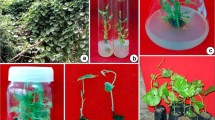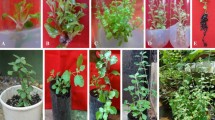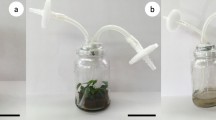Abstract
An in vitro propagation protocol has been developed for Excoecaria agallocha L. (Euphorbiaceae), a mangrove species. Nodal segments were used for axillary shoot proliferation. One shoot from each node of binodal explants was observed 3 weeks after inoculation. The best axillary sprouting was seen on a newly formulated medium containing BA, Zeatin and IBA in concentrations of 13.3 μM, 4.65 μM and 1.23 μM, respectively. The new medium, first used in this study, has a specific composition of major nutrients, MS micronutrients and iron compounds. Nodal segments from rooted cuttings and seedlings responded better than those of mature tree explants. Multiple shoot induction was complemented with efficient shoot elongation, and repeated subculture of binodal segments from axillary shoots resulted in 10–12 shoots per explant in 3 months. Rooting was achieved by growing shoots in the new medium with 0.23 μM IBA. Regenerated plants were successfully acclimatized to the natural environment, and about 85% of plantlets survived under ex vitro conditions. This is the first report of micropropagation in the genus Excoecaria and also in mangrove tree species.
Similar content being viewed by others
Author information
Authors and Affiliations
Additional information
Received: 11 August 1997 / Revision received: 10 February 1998 / Accepted: 2 March 1998
Rights and permissions
About this article
Cite this article
Srinivasa Rao, C., Eganathan, P., Anand, A. et al. Protocol for in vitro propagation of Excoecaria agallocha L., a medicinally important mangrove species. Plant Cell Reports 17, 861–865 (1998). https://doi.org/10.1007/s002990050498
Issue Date:
DOI: https://doi.org/10.1007/s002990050498




